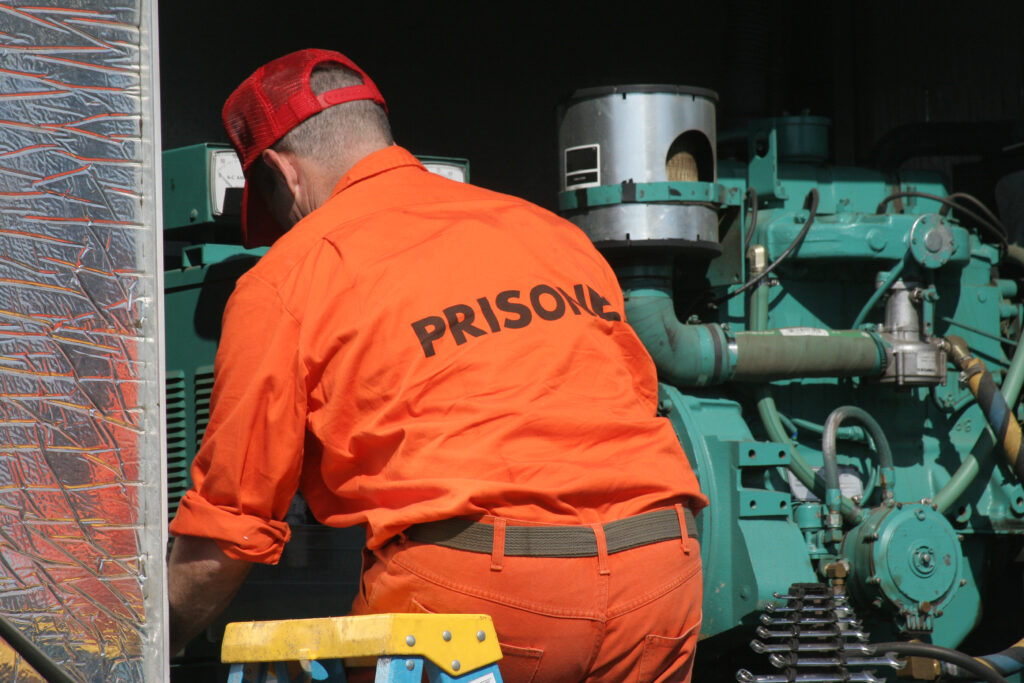Unfree labour is still alive and well in the United States, a century and a half after the civil war that supposedly put an end to it. Ironically, it still considered legal because of the very constitutional amendment that abolished slavery in 1865.
In 2018, Jailhouse Lawyers Speak (JLS), a network of incarcerated prisoners’ rights advocates, issued a list of grievances that addressed unfree labour in the contemporary United States. The document called for improvements to prison conditions, the reform of harsh sentencing practices, and the restoration of basic constitutional rights to those behind bars.
One of the demands was for an immediate end to modern-day slavery in prisons, perpetuated against more than half of the more than 1.5 million men and women in state and federal prisons through coercion and paltry compensation. In turn, JLS called for prisoners who work to be paid the prevailing wage in their state or territory. By identifying unpaid prison labour as a form of slavery, JLS also cast a spotlight on the enduring legacy of chattel slavery in the United States, more than a century and a half after its abolition.
The JLS statement was developed through deliberations that sought to be inclusive of all those held in chains, including more than 670,000 men and women held in local jails and 48,000 people in immigrant detention facilities. It served as the first public announcement of the 2018 National Prison Strike. Beginning on 21 August to mark the 1971 assassination of imprisoned intellectual and Black revolutionary George Jackson, the protest ranged from labour and hunger strikes to sit-ins and boycotts of commissaries, where prisoners can purchase food and other items.

Black prisoners played a lead role in persuading fellow prisoners, inmates, and detainees of all racial backgrounds to participate. Racial bias, structural disadvantages and anti-drug policies mean that disproportionate numbers of African Americans are incarcerated. They make up 13 percent of the American population but 34 percent of its prisoners.
The national prison strike also highlighted how the USA uses mass incarceration as a system of social control largely directed at its poorest citizens. A 2017 study estimated that across the country, incarcerated people earn between 86 cents and $3.45 per day in custodial, maintenance, laundry, grounds keeping, and food service work – all jobs that maintain the prison institution. Roughly six percent of state prisoners work for various state-owned businesses, stamping license plates, assembling furniture, or fighting wildfires, and make about double these wages. The few who receive a prevailing local wage work for private businesses that contract with state prisons.
This study also found that prison jobs were unpaid in Alabama, Arkansas, Florida, Georgia, South Carolina and Texas – all former slaveholding states whose secession prompted the 1861–5 US Civil War. Ironically, the legality of this unpaid labour is maintained by the 13th Amendment to the US Constitution, which abolished slavery but exempted punishment for a crime from this broader prohibition. And whether unpaid or poorly compensated, this labour is often coerced, with little to no regulation or oversight preventing officials from using the threat of solitary confinement and other punishments to ensure the prisoners’ cooperation. One estimate puts the value of prison labour, both paid and unpaid, at a minimum of $2 billion.
One of the first protests in solidarity with the 2018 strike was a work strike by a group of migrant asylum seekers held in the Northwest Detention Center in Tacoma, Washington. Operated by the GEO Group, a corporation under contract with US Immigration and Customs Enforcement, this private facility has become notorious for its harsh conditions and for forcing detainees to work for a dollar a day. Their detention is a matter of civil law, with detainees awaiting an asylum or deportation hearing. Such privately run facilities have become infamous for retaliating against those who refuse to work. These facilities hold less than 10 percent of the state and federal prison population, but over 70 percent of immigration detainees.
By the time it ended on 9 September, the anniversary of the 1971 Attica prison uprising that called for better living conditions and political rights, the national prison strike had lasted for 18 days and reached at least 16 state and federal prisons. It had also garnered unprecedented mainstream media coverage as well as the endorsement of more than 200 community organizations, with supporters conducting call-in campaigns, noise demonstrations, teach-ins and various nonviolent protests.
After the 2020 election, several Democratic members of Congress introduced a resolution to remove the punishment exemption from the 13th Amendment, but it failed to gain the support needed to pass. The Biden administration has since done little to address the wages paid to federal prisoners or restrict practices in privately run facilities. More than 20 states still have clauses on involuntary servitude or forced prison labour in their constitutions.
Toussaint Losier
